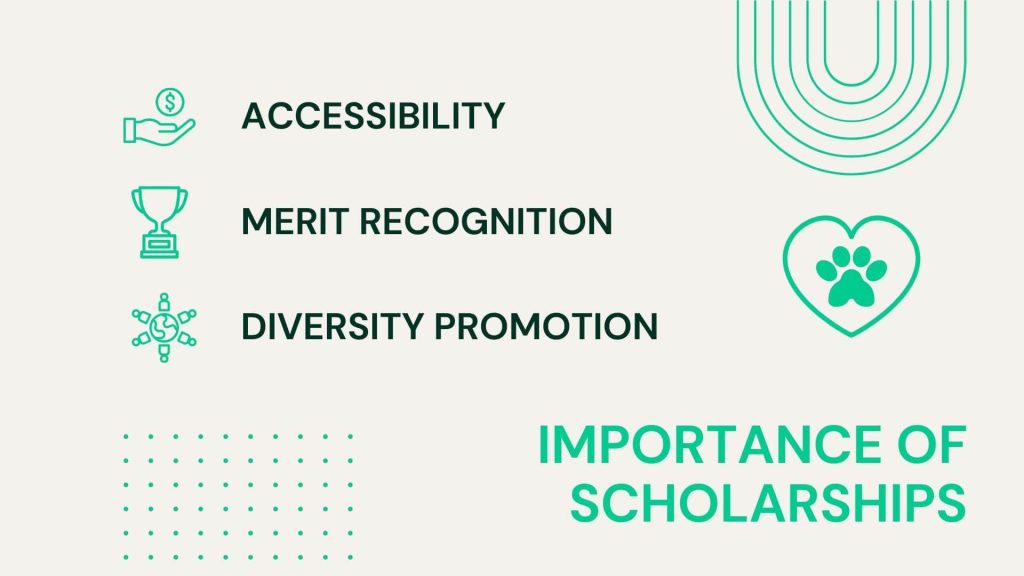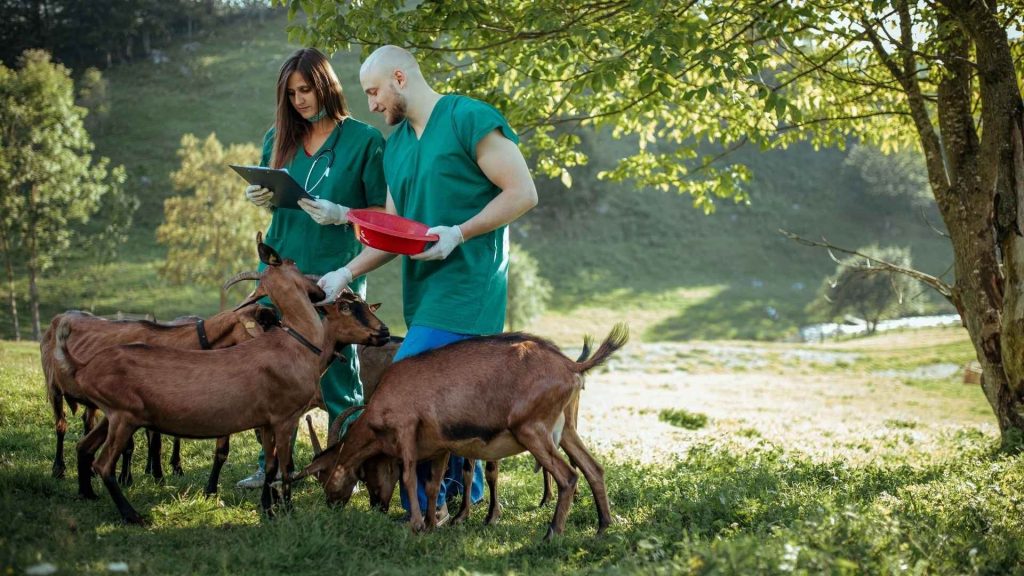For many, animals are a beloved and treasured part of their lives. They serve as friends, siblings, companions, and even mentors. When they fall ill, it can take a heavy toll on their owners. Veterinarians, commonly known as vets, are an essential part of ensuring your pet has a swift recovery and can return home to be with the family again!
In many respects, veterinary school is even more demanding than medical school, and with such an intensive education comes high costs. But that’s where our organization comes in. After scouring the web, we’ve compiled a list of the best veterinary scholarships to support aspiring vets looking to pay for a veterinary medical education! In addition, keep reading to find out about other forms of financial aid and tips on applying for college scholarships!
Discover all the best scholarships by demographics and state and academic year at Scholarship Institute!

Understanding Veterinary Scholarships
Becoming a veterinarian is an exciting journey, but it can also be financially challenging. Veterinary scholarships are a type of financial aid specifically created to help students studying veterinary medicine. Unlike loans, which you have to pay back with interest, scholarships are essentially gifts that reduce the financial burden without any conditions.
How Scholarships Differ from Other Financial Aid
Scholarships differ from other financial aid types, such as grants or work-study programs. While grants also don’t need to be repaid, they are usually based on financial need and funded by government sources. On the other hand, scholarships are often based on merit—given for academic excellence, leadership qualities, or specific talents—and can be offered by private organizations, educational institutions, or professional associations.
Importance of Scholarships
- Accessibility: Scholarships play a crucial role in making veterinary education more accessible to deserving candidates who might otherwise be unable to afford it.
- Merit Recognition: They acknowledge and reward the hard work and potential of aspiring veterinarians, providing them with much-needed encouragement.
- Diversity Promotion: By offering financial support to a diverse range of applicants, scholarships help cultivate a varied and inclusive veterinary community.
Apply to some easy, no-stress scholarships today with just a few clicks!

Veterinary Scholarship Providers You Should Know About
Aspiring veterinarians, rejoice! There’s a treasure trove of scholarships designed to ease the financial burden and help you achieve your dreams. Whether you’re an academic star or someone who could use a little financial boost, there’s likely a scholarship that suits your needs. Let’s dive into some of the major players in the veterinary scholarship arena.
1. American Veterinary Medical Foundation (AVMF)
The American Veterinary Medical Foundation (AVMF) is a prominent provider of scholarships for veterinary students. They offer several programs catering to various student needs:
- Eligibility Criteria: Typically, applicants should be enrolled in an accredited college for veterinary medicine and demonstrate both academic excellence and financial need.
- Application Process: Generally involves submitting transcripts, personal statements, and letters of recommendation. Deadlines vary, so staying updated via their website is crucial.
2. Association of American Veterinary Medical Colleges (AAVMC)
The Association of American Veterinary Medical Colleges (AAVMC) is one of the best professional veterinary organizations offering substantial support:
- Scholarship Programs: AAVMC collaborates with numerous partners to provide various scholarships. These range from merit-based scholarships to those targeting underrepresented groups in veterinary medicine.
- Eligibility Requirements: Often requires maintaining a high GPA and involvement in extracurricular activities related to veterinary science.
- How to Apply: Applications usually require detailed essays about your career goals alongside academic records.
3. Other Notable Scholarship Providers
Several other organizations contribute significantly to supporting veterinary students:
- Zoetis/AAVMC Veterinary Student Scholarship Program: Focuses on students who have demonstrated leadership potential within the profession. Offers 200+ scholarships of $7000 each.
- Banfield Foundation Scholarships: Provides need-based scholarships aimed at alleviating financial strain for students committed to small animal practice.
Exploring these opportunities not only lightens the financial load but also connects you with a community passionate about advancing veterinary medicine. Each scholarship has its own unique requirements and perks, so it’s wise to dig deeper into what aligns best with your aspirations.
Consulting scholarship platforms is another way to find curated scholarships. Check out our reviews of the best scholarship platforms to facilitate your scholarship search!
Graduate students, like vet school students, often require the most financial support for their academics. Add to your finances with these grad school scholarships!

Exploring State-Specific and Institution-Specific Scholarship Opportunities
When it comes to financing a veterinary education, casting a wider net can often lead to catching the best opportunities. While national programs are well-known, state-specific scholarships and institution-specific opportunities offer additional avenues for aspiring veterinarians seeking financial aid.
Why Look at Local and School-Based Scholarships?
State-specific scholarships are tailored to students residing within a particular state or planning to practice there post-graduation. These scholarships often aim to address local veterinary needs, such as shortages in rural areas, specific animal health concerns, or pressing health and research needs prevalent in the region. By considering these options, students may not only receive financial support but also connect with future career prospects within their home state.
Similarly, institution-specific opportunities are scholarships offered directly by veterinary schools themselves. Each school may have unique criteria based on its mission or focus areas—such as health and research needs, community service, or specific fields like food and animal practice. Aspiring veterinarians who align with a school’s emphasis can find themselves eligible for targeted scholarship awards.

Examples of Unique Opportunities
- Wisconsin Veterinary Medical Association Scholarships: Designed for students enrolled in or accepted to an accredited veterinary program within Wisconsin. These scholarships prioritize candidates who demonstrate a commitment to practicing in the state upon graduation.
- Cornell University College of Veterinary Medicine: This prestigious institution offers several merit-based scholarships that reward academic excellence and leadership potential among its students.
- California Veterinary Medical Foundation (CVMF) Scholarships: Available for California residents attending any AVMA-accredited veterinary college, focusing on those committed to serving California’s diverse animal populations.
- Penn Vet Opportunity Scholarship: Offered by the University of Pennsylvania, this scholarship targets students from underrepresented backgrounds and pairs them with mentors, in addition to providing a financial award.
Eligibility Requirements for Veterinary Scholarships: What You Need to Know
Navigating the eligibility criteria for veterinary scholarships can be a daunting task, but understanding these requirements is crucial for your application success. Here’s what you need to know:
Common Eligibility Criteria:
- Enrollment in an Accredited Program: Most scholarships require applicants to be enrolled in an accredited veterinary program. This ensures that the education provided meets specific standards, guaranteeing quality and consistency.
- Academic Performance: Maintaining a certain GPA is often a requirement. Scholarships aim to support students who demonstrate academic excellence, so it’s essential to keep your grades up.
Specific Fields Within Veterinary Medicine:
Some scholarships may prioritize particular fields within veterinary medicine, such as zoonotic diseases, wildlife conservation, or animal behavior. Additionally, certain opportunities may specifically target third-year veterinary students who are focusing on specialized areas of study. It’s beneficial to research which areas are emphasized by different scholarship programs.
Other Considerations:
- Extracurricular Involvement: Active participation in relevant extracurricular activities can enhance your application. Leadership roles or volunteer work related to animal care can make a significant difference.
- Financial Need: Certain scholarships may also take financial needs into account, aiming to support students who might otherwise struggle to afford their education.
Although medical school and veterinary school are usually viewed as two separate graduate schools, some scholarship providers include veterinary students in their medical school scholarships. Check out some of the top medical school scholarships!

Tips for Crafting a Winning Scholarship Application as an Aspiring Veterinarian
1. Tailor Your Personal Statement
Your personal statement is your chance to convey your passion for veterinary medicine. Make it unique to you by sharing specific experiences or challenges you’ve overcome. Highlight why you’re pursuing this path and how the scholarship will help you achieve your goals. Remember, authenticity resonates.
2. Showcase Relevant Experience
Include any relevant work experience, volunteer work, or internships in your application. If you’ve spent time shadowing veterinarians or working at an animal shelter, these experiences can set you apart from other candidates. Be sure to explain what you learned and how it influenced your career choice.
3. Secure Strong Letters of Recommendation
Letters of recommendation are crucial components of successful applications. Choose individuals who can speak to your academic abilities and passion for veterinary medicine, such as professors or professionals in the field with whom you’ve worked closely. Provide them with ample time and information about the scholarship to write a personalized and compelling letter on your behalf.
4. Pay Attention to Details
A polished application reflects your professionalism. Double-check for spelling and grammatical errors, follow all instructions carefully, and ensure that every document is complete before submission.
5. Highlight Unique Attributes
If you have skills or experiences that are particularly rare or valuable in the veterinary field, make them known! Whether it’s a knack for innovative problem-solving or experience with exotic animals, emphasize what makes you stand out. Making sure you’re one of the few outstanding veterinary students with passion and something unique to offer will go a long way.
Maximize your chances of securing a scholarship by boosting your grades with these top tutoring programs by subject!

Exploring Additional Financial Aid Options Beyond Scholarships
While veterinary scholarships are a fantastic way to alleviate the cost of education, they aren’t the only financial aid options available. Aspiring veterinarians should consider a range of alternatives:
1. Federal Student Loans
One of the most common forms of financial aid, these loans offer flexible repayment plans and lower interest rates than private loans. They can be an essential resource for covering tuition and other educational expenses.
2. Loan Repayment Programs
A loan repayment program can significantly reduce student debt and is designed for graduates pursuing careers in public service or underserved areas. Participants may have portions of their loans forgiven in exchange for committing to work in specific roles or regions.

Frequently Asked Questions About Veterinary Scholarships
1. Can You Do the FAFSA for Vet School?
Absolutely! The Free Application for Federal Student Aid (FAFSA) is not just for undergraduates. Aspiring veterinarians attending accredited veterinary schools can use the FAFSA to determine their eligibility for federal student loans and grants. This critical step helps in securing the financial support needed throughout your educational journey.
2. How Much Do Vets Earn?
Earnings for veterinarians can vary based on factors like location, specialization, and experience. According to the U.S. Bureau of Labor Statistics, as of May 2023, the median annual wage for veterinarians was approximately $119,100 per year. Those working in specialized veterinary clinical research fields or with extensive experience may earn significantly more.
3. What is the #1 Vet School in the U.S.?
The title of #1 veterinary school often goes to Cornell University’s College of Veterinary Medicine, known for its exceptional research facilities and comprehensive curriculum. Rankings can fluctuate based on criteria such as academic reputation and research output, so it’s always wise to check the latest rankings from reputable sources like U.S. News & World Report.
Answer more of your education and finance-related questions with our Scholarship Institute blog!

Lucy Maddox
Lucy’s international upbringing in Hong Kong and love for literature have shaped her multifaceted background. She attended university in Middlebury, Vermont, before settling in Arlington, Virginia. In her free time, Lucy enjoys True Crime podcasts, thrillers, literary fiction, running, hiking, exploring Washington, D.C.'s newest restaurants, and blogging about her latest travels.






